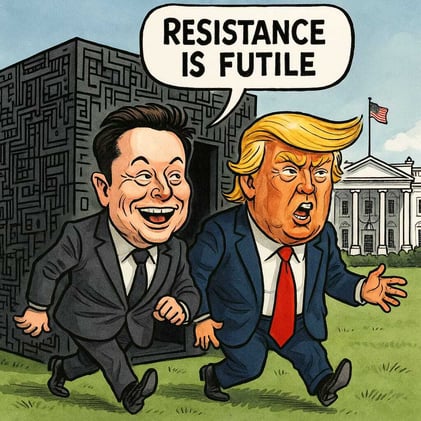- Pascal's Chatbot Q&As
- Archive
- Page 54
Archive
Violent strategies that a hypothetical future U.S. administration, specifically a Trump administration as per the query's premise, might deploy to ensure compliance from a large dissenting populace.
The report will draw on historical examples of dictatorial practices, focusing on mechanisms of violent repression, institutional frameworks supporting such violence, and the targets of these regimes.

The EU’s rapidly evolving digital agenda, particularly its commitment to unlocking and reusing large datasets for AI development, puts publishers at a critical crossroads.
If publishers do not proactively engage, they risk having their content mined, commoditized, or distorted by AI developers without adequate safeguards for attribution, integrity, or financial return.

AI adoption at work might be hurting employees' mental health. AI can make employees feel unsafe, stressed, and even depressed — unless they are supported by strong, ethical leadership...
...and feel psychologically secure at work. AI does reduce employees’ sense of “psychological safety” (the feeling that they can speak up, take risks, or ask for help without fear)...

GPT-4o: Stargate is a symbol of AI's frontierism—grand, risky, transformative. It may fuel the next scientific renaissance or become this era's most expensive miscalculation.
We’re betting billions on a wormhole whose exit remains unknown. Proceed—but with clear eyes, a diversified plan, and democratic oversight.

GPT-4o: The EU AI Act only requires energy disclosure for training, not inference, even though inference is more power-intensive. Data centers will demand gigawatts, threatening to divert power...
...from other sectors. If power-intensive inference is left unregulated, there’s a risk of massive environmental degradation going unnoticed.

This report analyzes evidence concerning a hypothesis that a potential 2025 Trump administration might endeavor to incite domestic conflict—such as protests, rioting, or demonstrations...
...to establish a pretext for invoking martial law, with the ultimate ambition of subverting democratic processes and retaining power indefinitely.

Society functions in a suspended state of disbelief, where people observe system failures—dysfunctional institutions, climate disasters, collapsing health infrastructure...
...yet carry on as if all is normal. This dissonance stems from powerlessness and fear. The overwhelming chaos breeds paralysis, not due to apathy, but emotional saturation.

GPT-4o: The firing of Shira Perlmutter and attempted installation of Trump loyalists in the Library of Congress represent a blatant abuse of power that violates constitutional norms, statutory law...
...and the doctrine of separation of powers. It reflects a disturbing pattern of authoritarian tactics deployed under the guise of executive efficiency or ideological retribution.

How a Trump-era initiative, the Department of Government Efficiency (DOGE), headed by Elon Musk, overrode expert-led NIH decisions to cancel hundreds of research grants.
The article is a stark warning about the consequences of politically driven science governance and offers insights into the broader risks to scientific integrity, public health, and democratic norms.

Gemini: Tech companies leverage the slow pace of science and the lack of definitive causal evidence to resist policy interventions and minimize their own accountability.
This dynamic ensures that timely, high-quality evidence of digital harms is often not produced, thereby weakening the ability of governments and society to regulate these powerful entities effectively

Joshua James Hatherley presents a philosophical and ethical critique of the rising optimism around the role of AI in healthcare. His thesis runs counter to the utopian vision promoted by AI champions
....like Eric Topol, who claim that AI will free doctors from bureaucracy and enable deeper human connection. Hatherley calls this view fundamentally misguided...

It is plausible that many Republicans focus on the immediate tactical advantages of Thiel's support—his significant funding, his intellectual cachet, and the potent anti-establishment narrative...
...he helps to craft—without fully confronting, or perhaps without fully understanding, the more radical, systemic disassembly that his underlying philosophy implies.












